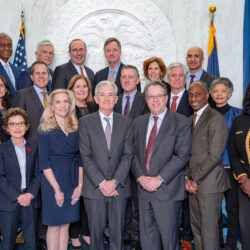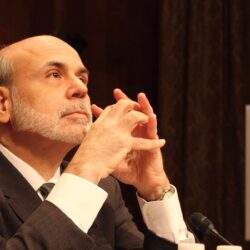
Inflation to the Nines
“Americans will have to decide for themselves if the claim made by Biden was a lie intended to mislead anyone not familiar with the trajectory of prices over the past several years, or an innocent error.” ~Peter C. Earle
Monetary policy influences inflation, employment, and economic activity. A stable but dynamic monetary system is vital for supporting economic growth, individual liberty, and a prosperous society. Therefore, we examine the causes and consequences of monetary policy (including inflation), identify ideal and practical steps towards a better monetary policy regime, and look at monetary alternatives and financial regulation.
TL Hogan
OP-1793,'Principles for Climate-Related Financial Risk Management for Large …, 2023
Cryptocurrencies, Blockchain, and Public Choice
RM Yonk, D Waugh
Cryptocurrency Concepts, Technology, and Applications, 2023
General Institutional Considerations of Blockchain and Emerging Applications
PC Earle, DM Waugh
The Emerald Handbook on Cryptoassets: Investment Opportunities and …, 2023
TL Hogan
The Review of Austrian Economics, 1-4, 2022
War, money & economy: Inflation and production in the Fed and pre-Fed periods
TL Hogan, DJ Smith
The Review of Austrian Economics, 1-23, 2022

“Americans will have to decide for themselves if the claim made by Biden was a lie intended to mislead anyone not familiar with the trajectory of prices over the past several years, or an innocent error.” ~Peter C. Earle

“The issue comes down to whether a state-chartered bank that fulfills the legal requirements for a master account can be denied one by the Federal Reserve.” ~Gerald P. Dwyer

“In the first quarter of 2024, the US economy expanded at a rate of 1.6 percent per year. That’s hardly an impressive growth rate, but it’s significantly faster than money supply growth. Money looks somewhat tight.” ~Alexander W. Salter

“We cannot just look at the Fed’s target rate to determine whether it is manipulating the market. We must consider its target rate relative to the natural rate.” ~Bryan Cutsinger

“Experts seemingly identify much more closely with the central bankers — the practitioners of monetary policy — than with those forced to contend with the negative consequences of bad decisions.” ~Judy Shelton

“The ratchet effect has locked us in a world with a massive Fed balance sheet — and the insidious problems of runaway deficit spending and easy bailout monetary expansion that come with it.” ~ Paul Mueller
250 Division Street | PO Box 1000
Great Barrington, MA 01230-1000
Press and other media outlets contact
888-528-1216
press@aier.org
This work is licensed under a
Creative Commons Attribution 4.0 International License,
except where copyright is otherwise reserved.
© 2021 American Institute for Economic Research
Privacy Policy
AIER is a 501(c)(3) Nonprofit
registered in the US under EIN: 04-2121305